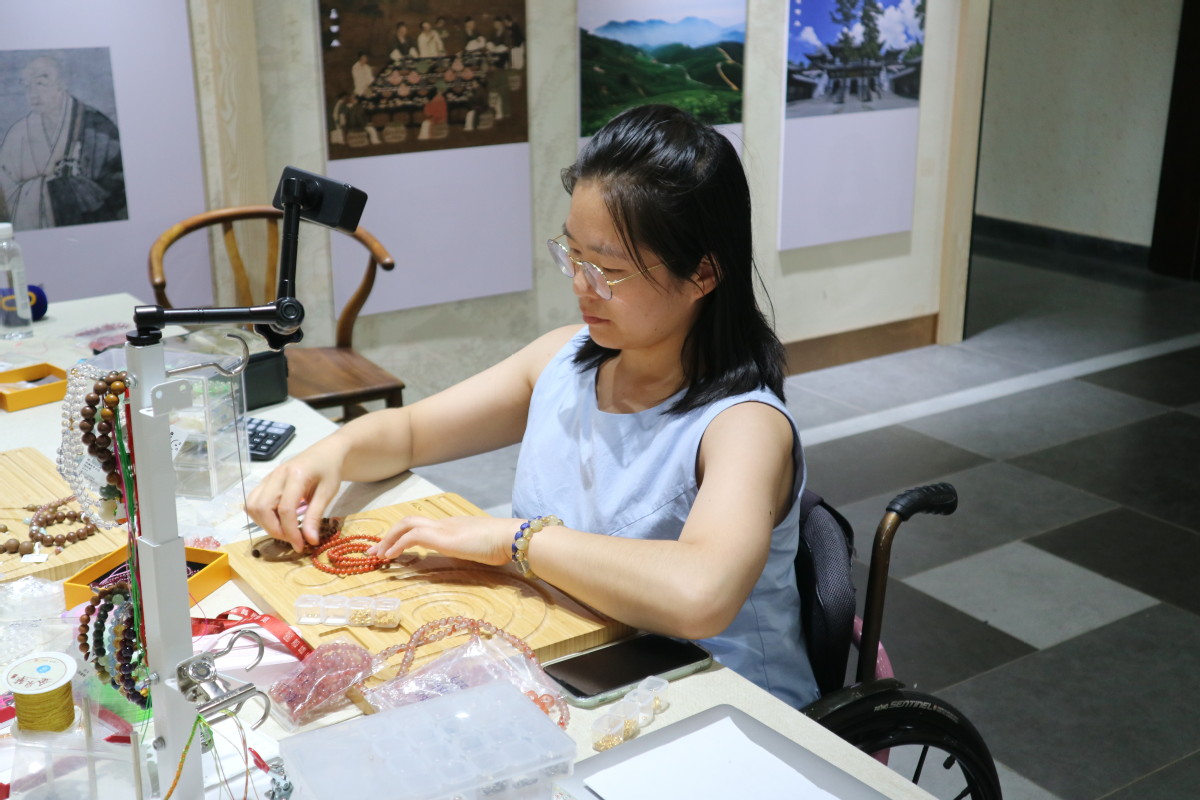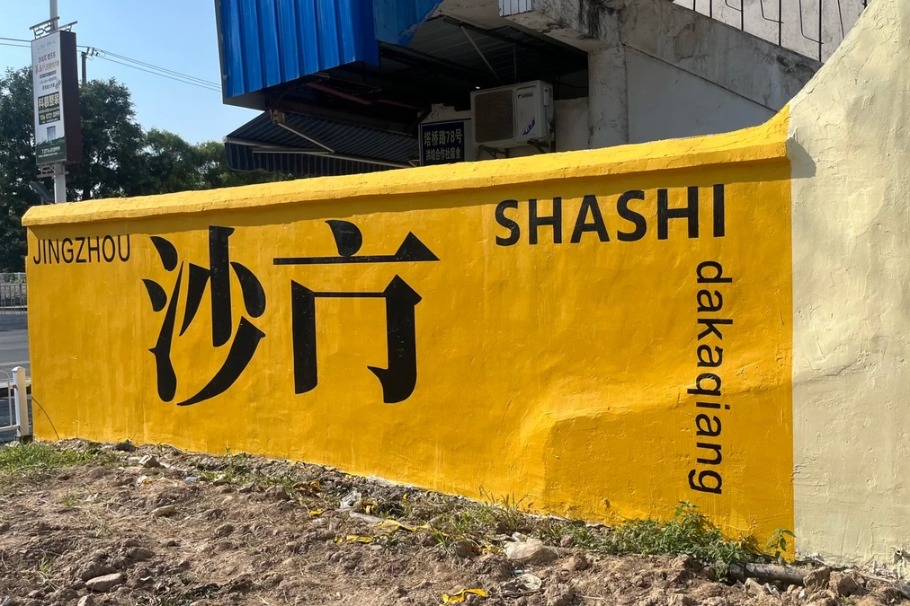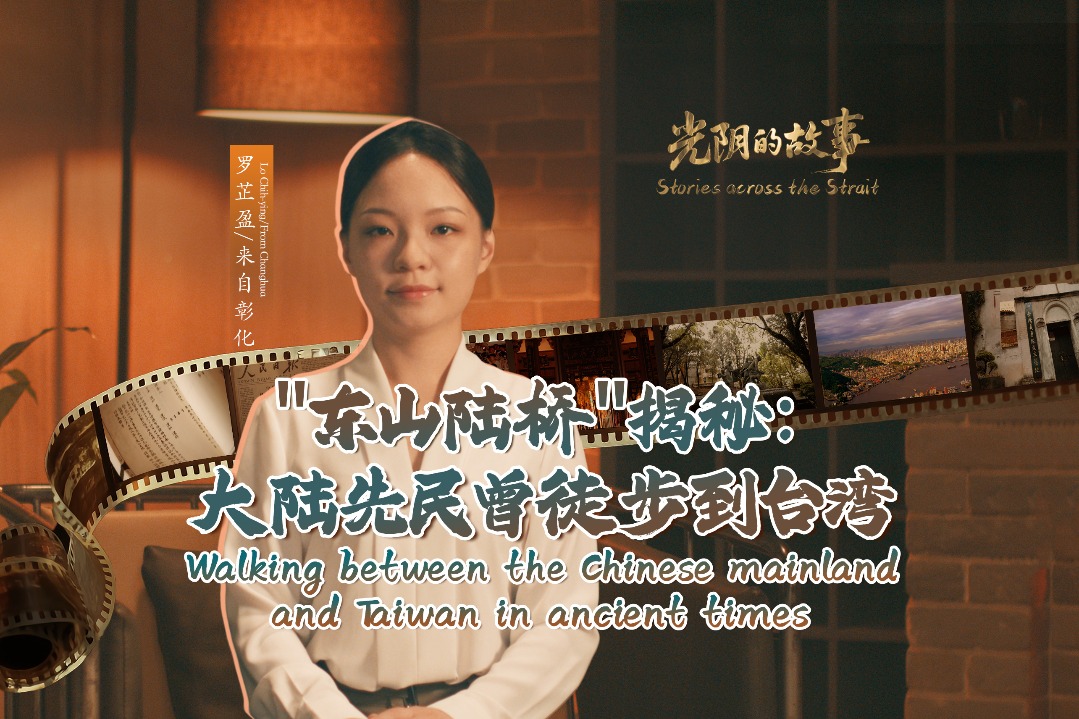Craft store brings hope to disabled people in Jingshan


In a roughly 30 square meter store, shelves are lined with bracelets carrying a gentle tea scent. These bracelets — each unique in its bead arrangement and showing signs of manual craftsmanship — bring hope to around 50 households with disabled people in Jingshan town in Hangzhou, Zhejiang province.
"Having experienced employment challenges myself as a disabled person, I opened this craft store to create job opportunities for others like me," said Zhang Ruixia, the store's manager, seated in her wheelchair. The 36-year-old added that the orange color that dominates the store's logo, packaging and interior design was chosen for its warmth and inclusivity.
Semiparalyzed after a surgical mishap in 2016, Zhang initially sank into despair but managed to pull herself together within just six months. She then attempted various jobs — including as a graphic designer at an advertising agency and a telephone customer service staffer at a wheelchair retailer — but found that "these jobs demanded prolonged sitting, which her body simply couldn't endure".
When Xu Hui, a public welfare worker, reached out to Zhang last year, she had already opened a small craft store in her hometown of Henan after teaching herself various weaving techniques and beadwork designs through online videos.
"Xu and I talked about how society is becoming more inclusive to people with disability, yet families with disabled people still face significant employment barriers, including some people who are unable to leave their homes to work, and mothers of those with intellectual disabilities struggling to take on full-time jobs," Zhang said. "I deeply resonated with his sentiments, so when he mentioned the Jingshan town project, I was like, 'That's it. Let's do it together.'"
"Previously, support for people with disabilities mainly involved providing supplies and skills training, but they often remained unemployed in the end," Xu said. "Our preliminary research found that what companies care about most is not who makes the product, but its quality. People with disabilities often demonstrate meticulous attention to detail and cherish every job opportunity, making them well-suited for craftwork."
The project — primarily targeting large companies, with additional sales channels through e-commerce platforms and physical stores — aims to secure stable orders, enabling disabled individuals to work either from home or at the workshop, on a part-time or full-time basis, Xu said.
Recognizing the feasibility and practicality of the project, the local government extended substantial support to expedite the store's opening. This involved streamlining the verification process for their volunteer group "Better and Better" and offering the physical store and the workshop at rents barely covering water and electricity expenses, he added.
"To distinguish the bracelets from others, we have creatively incorporated Jingshan tea into the bead-making process," Zhang said, adding that the tea, as one of Zhejiang's top 10 famous teas, is not only a local specialty but also a crucial cultural origin of the Japanese tea ceremony.
After three months of trials, Zhang finally developed a composite crafting technique that builds on traditional incense bead-making methods, with aged Jingshan tea as the primary raw material. This involves grinding the tea leaves into a powder finer than 120 mesh (around 0.125 millimeter), blending it with an optimized ratio of plant-based adhesives, mechanically kneading the mixture to achieve cohesion, and finally drying it for structural stabilization in the shade.
The store opened in October, and businesses have already extended it partnership opportunities. In addition, around 50 disabled people have come forward to apply. They are able to take orders and be paid per piece after training.
Bai Yunfeng, a man in his late 40s who is crippled by polio, exhibits surprising dexterity despite lacking prior experience in bracelet making. He is capable of completing a simple design in just a couple of minutes.
"I used to work at a mechanical equipment assembly factory. However, this store has provided me with another fulfilling opportunity," Bai said. "Besides closer proximity to home and better pay, I feel like we are not objects of pity, but rather treated equally and valued for our capabilities here, which is very important to me."
"I hope to expand such stores nationwide, with tailored innovations for each place based on local specialties," Zhang said. "I want to do my best to provide a shelter for those like me."
- Craft store brings hope to disabled people in Jingshan
- Drone-deployed rainfall station launched in Sichuan
- Xizang cycling race attracts 17 global teams
- Guizhou advances clean energy with new comprehensive base
- Chinese scientists develop high-precision dataset to sustain alpine study
- Chinese researchers quantify global wetland carbon sink





































